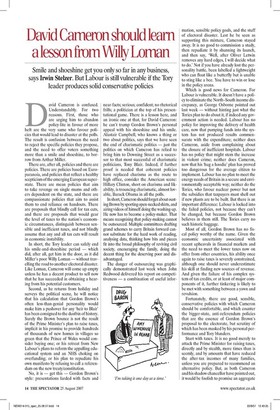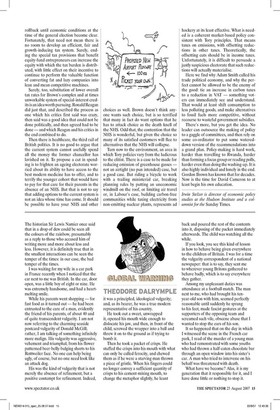David Cameron should learn a lesson from Willy Loman
Smile and shoeshine get you only so far in any business, says Irwin Stelzer. But Labour is still vulnerable if the Tory leader produces solid conservative policies David Cameron is confused. Understandably. For two reasons. First, those who are urging him to abandon policy-lite in favour of more heft are the very same who favour policies that would lead to disaster at the polls. The result is confusion between the need to reject the specific policies they propose, and the need to offer voters something more than a smile and shoeshine, to borrow from Arthur Miller.
There are, after all, policies and there are policies. There are policies based on Europaranoia, and policies that reflect a healthy scepticism of the emerging European superstate. There are mean policies that aim to take revenge on single mums and others dependent on the state, and there are compassionate policies that aim to assist them to end reliance on handouts. There are proposals that blindly call for tax cuts, and there are proposals that would gear the level of taxes to the nation's economic circumstances, distinguish between sensible and inefficient taxes, and not blindly assume that any and all tax cuts will result in economic instability.
In short, the Tory leader can safely end his smile-and-shoeshine period — which did, after all, get him in the door, as it did Miller's poor Willy Loman — without travelling the road to another electoral disaster. Like Loman, Cameron will come up empty unless he has a decent product to sell now that he has succeeded in obtaining a hearing from his potential customers.
Second, as he returns from holiday and surveys the political scene, he will notice that his calculation that Gordon Brown's often less-than-genial personality would make him a pushover for any 'heir to Blair' has been consigned to the dustbin of history. Surely the Brown bounce is not the result of the Prime Minister's plan to raise taxes, implicit in his promise to provide hundreds of thousands of new homes in villages so green that the Prince of Wales would consider buying one; or his retreat from New Labour's plans to reform the appalling educational system and an NHS choking on overfunding; or his plan to repudiate his own manifesto by refusing to call a referendum on the new treaty/constitution.
No, it is — get this — Gordon Brown's style: presentations larded with facts and near-facts; serious; confident; no rhetorical frills; a politician at the top of his presentational game. There is a lesson here, and an ironic one at that, for David Cameron: he can't trump Gordon Brown's personal appeal with his shoeshine and his smile. Alastair Campbell, who knows a thing or two about politics, says that we have seen the end of charismatic politics — just the politics on which Cameron has relied to bring him to Downing Street as a successor to that most successful of charismatic politicians, Tony Blair. Indeed, if further proof is needed that coherent policies have replaced charisma as the route to high office, consider the American scene: Hillary Clinton, short on charisma and likability, is trouncing charismatic, almost lovable, Barack Obama in all the polls.
In short, Cameron should forget about ousting Brown by sporting open-necked shirts, and airing videos of himself doing the washing-up. He now has to become a policy-maker. That means recognising that policy-making cannot be outsourced. Multiple committees drafting grand schemes to carry Britain forward cannot substitute for the hard work of reading, analysing data, thinking how bits and pieces fit into the broad philosophy of reviving civil society, encouraging the family, doing the decent thing for the deserving poor and disadvantaged.
The danger of outsourcing was graphically demonstrated last week when John Redwood delivered his report on competitiveness — a combination of useful information, sensible policy goals, and the stuff of electoral disaster. Lest he be seen as supporting this mixture, Cameron stayed away. It is no good to commission a study, then repudiate it by shunning its launch, and then say, 'Well, after Oliver Letwin removes any hard edges, I will decide what to do.' Not if you have already lost the personality battle, been labelled a lightweight who can float like a butterfly but is unable to sting like a bee. You have to win or lose in the policy arena.
Which is good news for Cameron. For Labour is vulnerable. It doesn't have a policy to eliminate the North–South income discrepancy, as George Osborne pointed out last week — without hinting just what the Tories plan to do about it, if indeed any government action is needed. Labour has no policy for improving the delivery of health care, now that pumping funds into the system has not produced results commensurate with the expenditure; neither does Cameron, aside from complaining about the closure of inefficient hospitals. Labour has no policy that might stem the increase in violent crime; neither does Cameron, now that his 'hug a hoodie' plan has proved too dangerous for the average citizen to implement. Labour has no plan to meet the energy needs of Britain in a secure and environmentally acceptable way; neither do the Tories, who favour nuclear power but not the subsidies that taxpayers must shell out if new plants are to be built. But there is an important difference: Labour is locked into the failed policies, not because they can't be changed, but because Gordon Brown believes in them still. The Tories carry no such historic baggage.
Most of all, Gordon Brown has no fiscal policy worthy of the name. Given the economic uncertainty associated with recent upheavals in financial markets and the need to meet the lower taxes now on offer from other countries, his ability once again to raise taxes is severely constrained, although one should never underestimate his skill at finding new sources of revenue. And given the failure of his complex system of tax credits, or at least of major components of it, further tinkering is likely to be met with something between a yawn and revulsion.
Fortunately, there are good, sensible, conservative policies with which Cameron should be comfortable, and which counter the bigger-state, anti-referendum policies that are the essence of Gordon Brown's proposal to the electorate, but scrutiny of which has been masked by his personal performance and Tory blunders.
Start with taxes. It is no good merely to attack the Prime Minister for raising taxes, directly and by stealth, more times than is seemly, and by amounts that have reduced the after-tax incomes of many families, unless you are prepared to recommend an alternative policy. But, as both Cameron and his shadow chancellor have pointed out, it would be foolish to promise an aggregate rollback until economic conditions at the time of the general election become clear. Fortunately, that need not mean there is no room to develop an efficient, fair and growth-inducing tax system. Surely, ending the special tax provisions that benefit equity-fund entrepreneurs can increase the equity with which the tax burden is distributed, with little effect on their incentive to continue to perform the valuable function of converting fat and lazy companies into lean and mean competitive machines.
Surely, too, substitution of lower overall tax rates for Brown's complex and at times unworkable system of special-interest credits is an idea worth pursuing. Ronald Reagan did just that, and described the process as one which his critics first said was crazy, then said was a good idea that could not be done politically, and then agreed had to be done — and which Reagan and his critics in the end combined to do.
Then there is healthcare, the third rail of British politics. It is no good to argue that the current system cannot usefully spend all the money the former chancellor has lavished on it. To propose a cut in spending is to frighten an ageing electorate worried about its ability to have access to the best modern medicine has to offer, and to terrify the younger cohort that would have to pay for that care for their parents in the absence of an NHS. But that is not to say that adding options to the current system is not an idea whose time has come. It should be possible to have your NHS and other choices as well. Brown doesn't think anyone wants such choice, but is so terrified that many in fact do want options that he has to attack choice as the death knell of the NHS. Odd that, the contention that the NHS is wonderful, but given the choice so many of its satisfied customers will flee to alternatives that the NHS will collapse.
Turn now to the environment, an area in which Tory policies vary from the ludicrous to the elitist. There is a case to be made for reducing emission of greenhouse gasses — not an airtight (no pun intended) case, but a good case. But riding a bicycle to work with a trailing ministerial car, breaking planning rules by putting an uneconomic windmill on the roof, or limiting air travel or, in Labour's case, building carbon-free communities while taxing electricity from non-emitting nuclear plants, represents ad hockery at its least effective. What is needed is a coherent market-based policy consistent with Tory principles. That means taxes on emissions, with offsetting reductions in other taxes. Theoretically, the offsetting cuts should be in income taxes. Unfortunately, it is difficult to persuade a justly suspicious electorate that such reductions will actually materialise.
Here we find why Adam Smith called his trade political economy, and why the perfect cannot be allowed to be the enemy of the good: tie an increase in carbon taxes to a reduction in VAT — something voters can immediately see and understand. That would at least shift consumption to less polluting goods, and make alternatives to fossil fuels more competitive, without recourse to wasteful government subsidies.
There's more, but you get the idea. No leader can outsource the making of policy to a gaggle of committees, and then rely on some co-ordinator to put some watereddown version of the recommendations into a grand plan. Policy-making is hard work, harder than travelling to Rwanda, harder than forming a focus group or reading polls, harder even than doing the washing-up. It is also highly individual and lonely in the end. Gordon Brown has known that for decades. Now is the time for David Cameron to at least begin his own education.
Irwin Stelzer is director of economic policy studies at the Hudson Institute and a columnist for the Sunday Times.










































 Previous page
Previous page